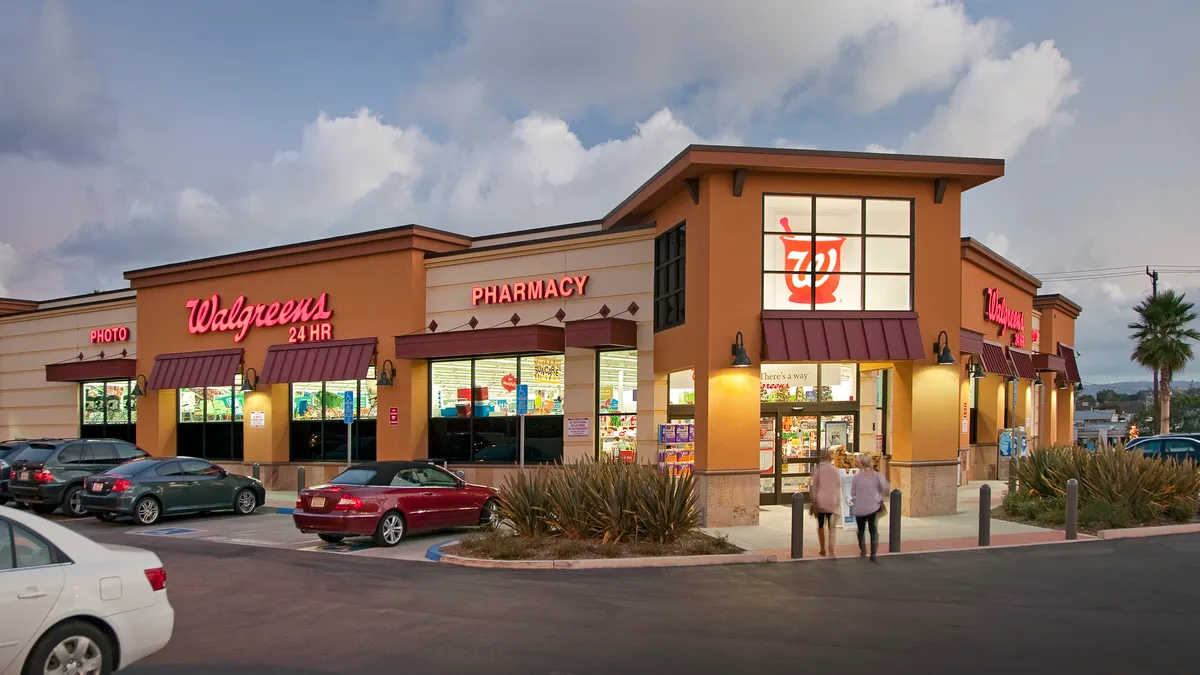Dive Brief:
- Walgreens will look to its grocery retail partnership with Kroger and private label offerings in health and beauty to strengthen its business after the company reported disappointing Q2 results, company officials said during an earnings call this week.
- The company saw lower-than-expected benefits from its refreshed retail offerings in its second quarter, primarily in the U.S., and continues to struggle with trends and changes in pharmacy, CEO Stefano Pessina said on the April 2 call.
- Moving forward, Pessina said Walgreens' key priorities are accelerating the digitalization of the company, transforming and restructuring its retail offering, modernizing its pharmacy and rolling out a transformational cost management program.
Dive Insight:
Walgreens hopes its emphasis on non-pharmacy offerings will reinvigorate its business and help the company keep pace with competitors. This was Walgreens’ worst quarter since 2014, and it follows a recent announcement to cut $1 billion in costs to stay competitive.
On the earnings call, executives emphasized the importance of the Walgreens' efforts with Kroger. "We continue to be pleased with the progress we are making on our partnerships," said Walgreens co-chief operating officer and president Alex Gourlay. "In particular, we are working closely with the Kroger executive team to determine how best to unlock future growth and synergies."
Kroger did not respond immediately to Grocery Dive’s request for comment on its partnership with Walgreens.
Walgreens and Kroger kicked off their partnership last October, with the drug chain offering Kroger online order pickup at 13 locations around Cincinnati. Two months later, Kroger began placing mini "Express" stores carrying more than 2,000 products — from private label groceries to fresh produce — inside those same locations. Kroger also placed Home Chef meal kits inside 65 Chicago-area Walgreens stores.
Right now, the partnership won’t move the needle much on grocery sales, with a tiny fraction of the nearly 10,000 Walgreens locations showcasing Kroger products. Outside of those locations, most Walgreens have a small but complete grocery offering including frozen foods, dairy items, fresh produce and shelf-stable products. With Kroger’s partnership, Walgreens could build on these offerings and scale its grocery capabilities at thousands of stores, creating additional competition for grocery retailers.
An expanded partnership would also generate additional revenue for Kroger, which has looked to partnerships and alternative investments as its core grocery business has struggled.
In addition to exploring a deeper relationship with Kroger, Walgreens has plans to invest in partnerships and private label brands in the health and beauty categories. According to company officials, Walgreens will shift resources to step up innovation and support flagship brands such as Walgreens Healthcare brands, which offer attractive margins. Walgreens is also an investor in beauty startup Birchbox, and will feature the company’s products at 11 Walgreens locations using a "mini store" model similar to the Kroger concept.
Shifting focus from pharmacy could ensure Walgreens' survival for the time being, but competition abounds. CVS remains a major rival and has been working to differentiate itself with cutting-edge offerings such as CBD products — which Walgreens recently began offering, too. Amazon also poses stiff competition for Walgreens across food, health and beauty as the e-commerce giant prepares its new grocery chain, with plans to carry products across similar categories.
Despite Walgreens' discouraging performance in Q2, the company appears optimistic that there is a clear way forward. "I am convinced that our existing strategic priorities are the right ones and will allow us to deliver sustainable growth into the future," CEO Stefano Pessina said during the earnings call.













